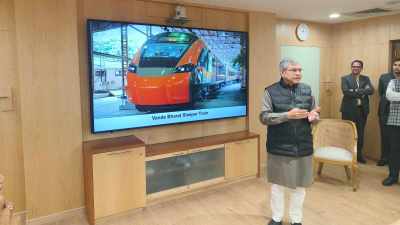Brilliance is not enough
The untimely passing of J.N. Dixit has raised some old questions of why the country went in for the National Security Council/Advisor system...

The untimely passing of J.N. Dixit has raised some old questions of why the country went in for the National Security Council/Advisor system that the US follows in a presidential system of governance. Most analysts in pushing the NSC system for India will quote how the government in 1949 adopted the Ismay Committee8217;s recommendations of taking national security decisions with the help of the Defence Committee of the Cabinet DCC. The most outstanding and quite possibly only example of the DCC8217;s exemplary work was the speed of the Indian response in 1949 in restoring the Nepal king to his throne after the revolt of the Ranas. The weakness of the DCC was that it had no permanent staff to provide it with institutional continuity, other than the joint services wing in the cabinet secretariat. This wing, consisting of a half dozen officers under a rotating two star officer was quite inadequate to coordinate the national security of a country as complex as India.
In any case, the DCC depended on the PM and the raksha mantri wanting the system, which they didn8217;t 8212; Krishna Menon, particularly. Security decisions wandered in the wilderness for over two decades until Arun Singh started the Defence Planning Group in 8217;86, which wrote the first paper suggesting the formation of a National Security Council NSC but, more importantly, forming a National Security Staff NSS. It was common knowledge that NSC members, who were ministers and no different from those attending the Cabinet Committee on Security, came for meetings unprepared. So the core of the new organisation, the NSC, was always supposed to be the NSS, a bunch of bright staffers, from the armed forces, the MEA, economists, scientists and administrators who would coordinate staff support under a chief of staff to the National Security Advisor NSA, maintain files and put up coordinated studies to the NSA, who would in turn present options to the PM.
The problem in executing this idea was that every bureaucracy in Delhi was unsure how much power they would retain and how much power the new NSC would gather. Some bureaucracies opposed the NSC and NSS, others tried to ignore it, and yet others tried to hijack it. Eventually, the MEA did manage to hijack it successfully by having both the NSA and the NSS chief selected with MEA backgrounds. This in many ways was unfortunate, because the MEA, staffed by very bright officers, has the poorest systems, the poorest organisation, a lackadaisical administrative culture and no formal education in 8216;staff8217; work. The result was that the NSA 8212; whether it was Brajesh Mishra or J.N. Dixit 8212; did outstanding personal work but was unsupported by a 8216;staff8217;, which was soon reduced to a 8216;secretariat8217; as happens in the MEA culture.
Speaking about culture, a larger failing of Indian cultural values intrudes here. Most Indians, but not all, often believe that some brilliant individual with god-like talents will ride in on a white charger and clean up all the mess, reform government, change attitudes and produce results. Except perhaps for the armed forces, there is little understanding or appreciation that any group of even average individuals working in a clean competitive environment of formalised staff work often out-produces and out-performs brilliant individuals. People like Sridharan of Delhi Metro and Narayana Murthy of Infosys create systems, but are not White Knights. The next NSA may or may not be a White Knight, but the last thing he needs is a secretariat run MEA style, instead of a staff.
The country today faces many difficult and complex choices, and solutions require intimate coordination between many government ministries. The country has run well past the abilities of the cabinet secretary to deliver the goods. The SC and the NSS must be made to work. To give Brajesh Mishra due credit, he understood that only the power of the PMO would insulate the NSA from the lethal jealousies of Delhi8217;s power structure and he initially combined the NSA8217;s post with that of the secretary in the PMO. This was a good decision at the time. Eventually the NSA will have to survive on the merit of the work done by his department.
This is a formidable task for a country of 1.2 billion people. For instance, is the US military assistance to Pakistan outweighed by the benefits of the India-US Next Steps Programme? If not, would a greater Indian tilt on assistance to the US in the Iraq election have redressed the balance? If the balance is not redressed, is the country prepared to up the defence expenditure for the next five years as the best option for an independent foreign policy? If the defence budget has to be increased, is there yet more money in the kitty to operationalise the technologies that the US might transfer to India in the NSSP? If not is there any merit in going through with the NSSP? These are decisions that only a well-structured NSS can deal with, because in looking at each of these issues, the interests of one government department directly clashes with that of another. Only a Central coordinating agency like the NSC supported by the NSS can pick out of this jumble, what benefits the country most. But these studies and analyses are simply not being done. The NSC and NSS do not even have access to a simulation centre, which for a complex decision making body, indicates a primitive attitude to the process of complex decision making. It is impossible to arrive at clearly mathematical decisions like the size of the country8217;s nuclear arsenal without gaming and simulation.
It is disturbing to know that four years after the NSC was formed these kind of decisions are being made subjectively. Even in assessing serious politico-military issues like the Kashmir problem, which alone has seven principal players on the Indian side and six on the Pakistani side, it is inconceivable how any government functionary can select options to present to the PM in the present method of working. We may select a genius as the next NSA but the urgent need is to create a sensible organisation, sensible systems and a rewarding working environment in which every middle seniority officer in the government will aspire to work for, instead of avoiding.
- 01
- 02
- 03
- 04
- 05































